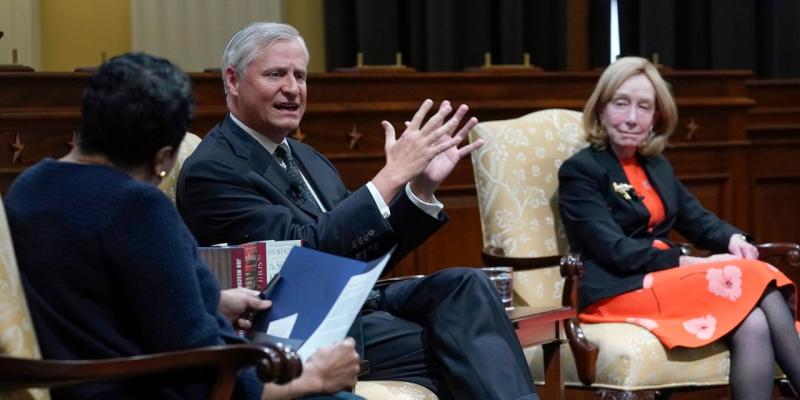'Popular' Historians Are No Longer Alone in Being Lured by Politics
By: Elliot Kaufman (WSJ)



History is in fashion in Joe Biden's Washington. If you want to flatter the president, call his latest initiative "historic." If you want him to flatter you, you'd better be working to "remedy past injustices." Mr. Biden even has a house historian, Jon Meacham, writing his major speeches.
Mr. Biden met earlier this month with a group of historians, including Michael Beschloss, Anne Applebaum and Sean Wilentz. The delegation from the past spent two hours informing the president (then, immediately after, the press) that American democracy is in danger and that our present moment is reminiscent of the lead-up to the Civil War.
You probably have an uncle who shares such insights on Facebook . Or maybe you are that uncle.
Mr. Biden might have been hoping to relive the brief period of optimism that occasioned his first historical roundtable, at the start of his presidency. There the president ventured that the moment called for another FDR and, wouldn’t you know it, it should be him. Historian Doris Kearns Goodwin was on hand to affirm the president’s analogy and urge him to aim high. Thanks a lot, Ms. Goodwin.
But I’ve made an amateur’s mistake. Ms. Goodwin, along with many of the others, is a popular historian. A term of dismissal among academics, the “popular” is said to signify that the historian strives for fluent, grand narratives at the expense of scholarly methods, analysis and complexity. In other words, popular historians write books that people want to read. Academic historians could do that if they wanted to, supposedly, but they forgo fame and fortune for intellectual seriousness and sophistication.
So, let’s get serious: What have historians done for us lately? A hullabaloo in the American Historical Association about “presentism” has me wondering.
The AHA, the discipline’s major professional organization, publishes a column by its president, James Sweet of the University of Wisconsin-Madison. In “Is History History? Identity Politics and Teleologies of the Present,” published Aug. 17, Mr. Sweet observed that his discipline is increasingly captive to contemporary left-wing politics. Presentism, he argued, is “neutralizing the expertise that separates historians from those in other disciplines. The allure of political relevance, facilitated by social and other media, encourages a predictable sameness of the present in the past. This sameness is ahistorical, a proposition that might be acceptable if it produced positive political results. But it doesn’t.”
In case that wasn’t clear, Mr. Sweet agrees with his fellow historians on politics. His column labeled as “dilettantism” the use of historical evidence by Justices Clarence Thomas and Samuel Alito in gun and abortion cases and denounced Republican interventions in curricula. But he also, gently, cast doubt on the New York Times’s “1619 Project”: “As journalism, the project is powerful and effective, but is it history?”
You’re history, many colleagues replied. Activist academics rained down abuse on Mr. Sweet, a historian of Africa and its diaspora, in many cases denouncing him simply for being white, male and out of step. Accusations of racism followed. “All history is presentism,” one historian scoffed, before comparing Mr. Sweet to Nazis. Some historians whipped up an email campaign in protest; others demanded that he resign from the AHA or threatened to cancel their memberships.
After a brief round on the ropes, Mr. Sweet cried uncle. In an abject self-criticism, he noted that his column “has generated anger and dismay among many of our colleagues and members” and declared his guilt. “I had hoped to open a conversation on how we ‘do’ history in our current politically charged environment. Instead, I foreclosed this conversation for many members, causing harm to colleagues, the discipline, and the Association.” He concluded by asking for mercy: “I hope to redeem myself.”
All the best show trials end in confession, and the more ludicrous, the better. The obvious falsity lets the audience in on what is really happening—frightful submission before an unjust power—and implicates them in the lie.
No colleagues were harmed by an article expressing a methodological disagreement, and the association ought to be able to handle one anodyne dissent in a sea of fashionable perspectives. (Mr. Sweet’s column was directly preceded on the website by “The Anthropocene: History and Legacy of the Colonial Mindset,” “From Bath Riots to Blocking Asylum: Public Health and Race at the US-Mexico Border” and “Listening to Alaska Native Elders.”) And the discipline? From the academy to the White House, it seems to be doing a good enough job of harming itself.





There is a difference between "popular historians" and Academic Historians," isn't there?
Sadly, there is an ideology that infects all that it touches and they in turn politicize their work.
Fascists? What Fascists? No fascists here! Modern History is only about Tom Brady, Jay-Z and Beyonce. There are no Fascists in the gop, but there are tons of dangerous Anti-Fascist among the Democrats! /S...
That is A LOT of injustices to remedy when it comes to Biden.
This article did a good job of making its point as obscure as possible.
Should Doris Kerns Goodman be forced to write a fake history of Trumpism that glorifies El Trumpo?